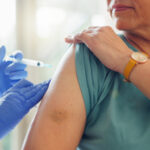-
November 14: The Week in Cancer News
Many doctors don’t prescribe hormone therapy in women with gynecologic cancers, and cancer-related crowdfunding often falls short of goals.
by Marci Landsmann
-
November 7: The Week in Cancer News
More people with breast cancer can forgo radiation after surgery, and a treatment combination helps control esophageal cancer.
by Thomas Celona
-
October 31: The Week in Cancer News
People with history of polyps often do not get follow-up colonoscopy after a positive FIT test, and early-onset cancers are rising in Corn Belt states.
by Eric Fitzsimmons
-
October 24: The Week in Cancer News
COVID vaccines may improve immunotherapy effects, and a drug combination reduces the risk for death in bladder cancer.
by Darlene Dobkowski
-
October 17: The Week in Cancer News
Prior authorizations pose a significant time burden for patients, and sentinel lymph node biopsy reduces side effects in cervical cancer.
by Marci A. Landsmann
-
October 10: The Week in Cancer News
Older people with multiple myeloma can receive a less toxic drug regimen, and the FDA approves an immunotherapy for people with high-risk skin cancer.
by Thomas Celona
-
October 3: The Week in Cancer News
Widespread uptake of HPV vaccine linked to reduced rates of cancer-causing infection in all, and radiation prevents recurrence in locally advanced bladder cancer.
by Eric Fitzsimmons
-
September 26: The Week in Cancer News
US trial to look at impact of AI-assisted mammograms, and vitamin B12 may help curb chemotherapy-associated hand-foot syndrome.
by Darlene Dobkowski
-
September 19: The Week in Cancer News
Report highlights progress against cancer amid call for federal government to fund cancer research, and low-dose aspirin fends off recurrence after surgery in colorectal cancer.
by Marci A. Landsmann
-
September 12: The Week in Cancer News
Combination of targeted therapy and chemotherapy prolongs survival in lung cancer, and FDA approves a chemotherapy-releasing device to treat bladder cancer.
by Thomas Celona
Cancer Talk
Biotin Supplements Can Skew Cancer Lab Results
Products containing biotin can alter lab tests for people during and after cancer treatment.
by Laura Gesualdi Gilmore
Connecting More Patients to Cancer Clinical TrialsAACR conference brings experts together to discuss strategies to reach people historically left out of cancer research.
by Eric Fitzsimmons
Treatment Combination Improves Survival in EGFR-positive Lung CancerAdding chemotherapy to targeted therapy improves outcomes for people with advanced EGFR-positive non-small cell lung cancer.
by Sandra Gordon
Lessons From 20 Years Living With CancerMultiple myeloma survivor Jonathan Gluck reflects on uncertainty, and the scientific progress that has kept him living with cancer for more than two decades.
by Eric Fitzsimmons














